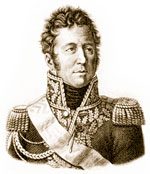Jacques Alexandre Bernard Law (Lauriston)

Marki af Lauriston, fransk officer, slægtning af John Law. Var samtidig med Bonaparte på artilleriskolen i Brienne; 1800 Bonapartes adjutant; 1801 i diplomatisk mission i København, hvor han overværede slaget på Reden. Efter Austerlitz divisionsgeneral. 1808 med Napoleon i Spanien, deltog 1809 med udmærkelse i slaget ved Wagram og førte derefter i Wien forhandlingerne om Napoleons giftermål med Marie Louise. Deltog i Ruslandstoget 1812, i felttoget 1813 (ved Lützen og Bautzen, fanget i slaget ved Leipzig). I de 100 dage ville han ikke slutte sig til Napoleon, blev derfor 1815 pair, 1817 marki og 1821 marskal. (HK6/1923)
MARQUIS DE LAURISTON (1768-1828), French soldier and diplomatist, was the son of Jacques Francois Law de Lauriston (1724-1785), a general officer in the French army, and was born at Pondicherry on the ist of February 1768. He obtained his first commission about 1786, served with the artillery and on the staff in the earlier Revolutionary campaigns, and became brigadier of artillery in 1795. Resigning in 1796, he was brought back into the service in 1800 as aide-de-camp to Napoleon, with whom as a cadet Lauriston had been on friendly terms. In the years immediately preceding the first empire Lauriston was successively director of the Le Fere artillery school and special envoy to Denmark, and he was selected to convey to England the ratification of the peace of Amiens (1802). In 1805, having risen to the rank of general of division, he took part in the war against Austria. He occupied Venice and Ragusa in 1806, was made governor-general of Venice in 1807, took part in the Erfurt negotiations of 1808, was made a count, served with the emperor in Spain in 1808-1809 and held commands under the viceroy Eugene Beauharnais in the Italian campaign and the advance to Vienna in the same year. At the battle of Wagram he commanded the guard artillery in the famous " artillery preparation " which decided the battle. In 1811 he was made ambassador to Russia; in 1812 he held a command in the Grande Armee and won distinction by his firmness in covering the retreat from Moscow. He commanded the V. army corps at Liitzen and Bautzen and the V. and XI. in the autumn campaign, falling into the hands of the enemy in the disastrous retreat from Leipzig. He was held a prisoner of war until the fall of the empire, and then joined Louis XVIII., to whom he remained faithful in the Hundred Days. His reward was a seat in the house of peers and a command in the royal guard. In 1817 he was created marquis and in 1823 marshal of France. During the Spanish War he commanded the corps which besieged and took Pamplona. He died at Paris on the i2th of June 1828.